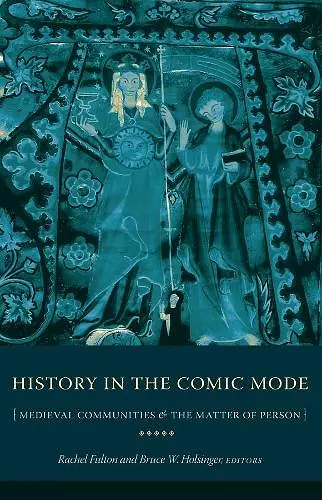History in the Comic Mode
Medieval Communities and the Matter of Person
Bruce W Holsinger editor Rachel Fulton editor
Format:Hardback
Publisher:Columbia University Press
Published:11th May '07
Currently unavailable, and unfortunately no date known when it will be back

With eloquence and erudition, Caroline Bynum persuaded a generation to reconsider the meaning of gender, subjectivity, and the self in the Middle Ages and beyond in light of medieval conceptions of community and emulation. This magnificent collection of essays by her former students testifies in turn to the power of one individual, her ideas, and her example to shape a community of scholars. These studies, like Bynum's own work, fill one with wonder and admiration. -- Jeffrey Hamburger, Harvard University In this intriguing, thought-provoking collection of essays, the question of medieval individualism is set forth in exciting ways that focus on exceptional characters and their communities and on personhood understood in terms of embodiment, torment (both positive and not), and contingency. The comic mode does not mean that all the stories collected here about visionaries, saints, and intellectuals are literally funny, but that history can be regarded as a series of stories that are often incomplete, unknown in their conclusion, or capable of being told another way. The reader comes away from these essays with a renewed sense of the color and variety of medieval personalities and admiration for the ability of the editors and contributors to reconstruct from fragments a convincing and multi-faceted picture of the Middle Ages. -- Paul Freedman, Chester D. Tripp Professor of History and Department Chair at Yale University This is a superb collection that demonstrates the range of scholarly work being done on medieval history and in particular shows the impact that Caroline Walker Bynum has had on an entire generation of medieval historians. The essays in the volume include gems of scholarly analysis that help change the way we perceive the sermons of Bernard of Clairvaux, conceptions of heresy, Machiavelli and Dante, monastic charters, merchants' records, cognitive theory as a tool for understanding medieval visions, and a great deal else. They also show how, in the face of fragmentary and sometimes frustrating evidence, historical understanding can still be achieved. -- Richard Kieckhefer, John Evans Professor of Religion, Northwestern University
Discusses continuity and change in ideas of personhood and community. This book argues for the viability of the comic mode and recovery of history. It features close readings of familiar and lesser known materials, offering provocative interpretations of John of Rupescissa's alchemym.In this groundbreaking collection, twenty-one prominent medievalists discuss continuity and change in ideas of personhood and community and argue for the viability of the comic mode in the study and recovery of history. These scholars approach their sources not from a particular ideological viewpoint but with an understanding that all topics, questions, and explanations are viable. They draw on a variety of sources in Latin, Arabic, French, German, Middle English, and more, and employ a range of theories and methodologies, always keeping in mind that environments are inseparable from the making of the people who inhabit them and that these people are in part constituted by and understood in terms of their communities. Essays feature close readings of both familiar and lesser known materials, offering provocative interpretations of John of Rupescissa's alchemy; the relationship between the living and the saintly dead in Bernard of Clairvaux's sermons; the nomenclature of heresy in the early eleventh century; the apocalyptic visions of Robert of Uzes; Machiavelli's De principatibus; the role of "demotic religiosity" in economic development; and the visions of Elizabeth of Schonau. Contributors write as historians of religion, art, literature, culture, and society, approaching their subjects through the particular and the singular rather than through the thematic and the theoretical. Playing with the wild possibilities of the historical fragments at their disposal, the scholars in this collection advance a new and exciting approach to writing medieval history.
An excellent addition to medieval studies. -- Thomas O'Donnell Comitatus
ISBN: 9780231133685
Dimensions: unknown
Weight: unknown
408 pages